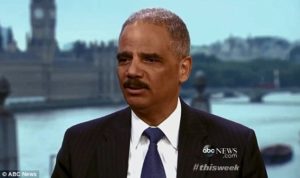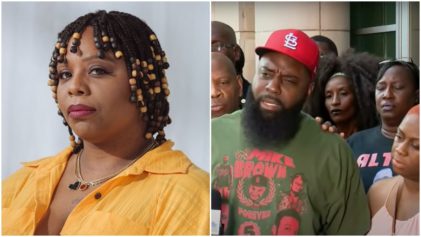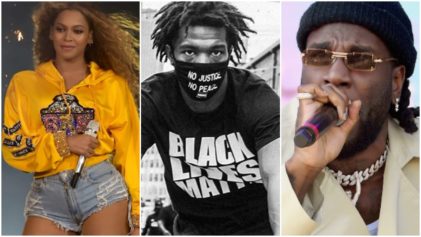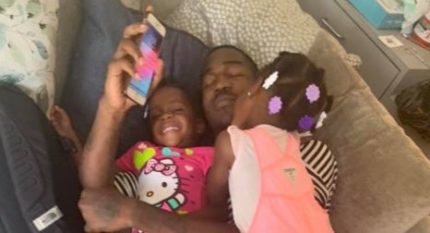
Along with dispatches on the visit of the nation’s top law enforcement official, media reports have focused on alleged witness accounts that sound closer to Wilson’s version of events—namely, that Brown was more of an aggressor during the conflict than earlier witness accounts related.
Some witnesses say that Brown moved toward Wilson, possibly in a threatening manner, when the officer shot him dead, according to the New York Times. But other witnesses say Brown was immobile, with his hands up.
One of the main witnesses, Brown’s friend Dorian Johnson, was interviewed by the FBI and the St. Louis County police last week for nearly four hours, according to his lawyer, Freeman R. Bosley Jr., who was the first African-American mayor of St. Louis, serving from 1993 to 1997. Bosley said Johnson admitted during the interview that he and Brown had stolen cigarillos from the store, according to the Times.
As for the altercation that led to Brown’s death, Bosley said that after Wilson told the two to get off the street, they told him they lived nearby and got into a verbal dispute with Wilson about whether walking in the street constituted a crime. Bosley said Wilson then reached out of the window with his left hand and grabbed Brown by the throat. When Brown pushed him off, the officer grabbed Brown’s shirt.
“My client sees the officer pull a gun and hears him say, ‘I’ll shoot you’ — then ‘pow!’ there was a shot,” Bosley said, referring to the one that apparently went off in the car. “He did not describe a scuffle. It was more of a scuffle for him to get away.”
Asked if Brown had ever punched Wilson, Bosley said that Johnson “did not observe that.”
It will be up to a grand jury to decide whether the accounts indicate that Wilson should be charged with murder. With such conflicting evidence, a grand jury might be likely to indict Wilson and let his fate be determined through a trial.
In addition to the question of what happened to Brown, the Justice Department might want to open a broader civil rights investigation to look at Ferguson’s police practices—something the Times said Holder has done in nearly two dozen such investigations into police departments. Justice Department data indicates that is more than twice as many as were opened in the previous five years.
Brown’s family has scheduled his funeral for Monday—a service that is bound to draw significant attention and emotion.
In advance of his visit to Ferguson, Holder wrote an open letter to the citizens of St. Louis that was published in the local St. Louis Post-Dispatch:
“At a time when so much may seem uncertain, the people of Ferguson can have confidence that the Justice Department intends to learn — in a fair and thorough manner — exactly what happened,” Holder wrote. “We understand the need for an independent investigation, and we hope that the independence and thoroughness of our investigation will bring some measure of calm to the tensions in Ferguson. In order to begin the healing process, however, we must first see an end to the acts of violence in the streets of Ferguson…Law enforcement has a role to play in reducing tensions, as well. As the brother of a retired law enforcement officer, I know firsthand that our men and women in uniform perform their duties in the face of tremendous threats and significant personal risk. They put their lives on the line every day, and they often have to make split-second decisions.”
“At the same time, good law enforcement requires forging bonds of trust between the police and the public,” he continued. “This trust is all-important, but it is also fragile. It requires that force be used in appropriate ways. Enforcement priorities and arrest patterns must not lead to disparate treatment under the law, even if such treatment is unintended. And police forces should reflect the diversity of the communities they serve.”
Clearly, Holder has put local authorities on notice that the federal government is watching closely and expects better of them than what they have demonstrated.
“It’s a powerful message,” William Yeomans, a law school fellow at American University who worked in the Justice Department’s Civil Rights Division for more than two decades, told The Associated Press. “He’s the embodiment of law enforcement, and the positive contribution he can make here is to assure the community that the federal government is taking very seriously the quest for justice in this incident.”
“This is my pledge to the people of Ferguson: Our investigation into this matter will be full, it will be fair, and it will be independent,” Holder said at the end of his letter. “And beyond the investigation itself, we will work with the police, civil rights leaders, and members of the public to ensure that this tragedy can give rise to new understanding — and robust action — aimed at bridging persistent gaps between law enforcement officials and the communities we serve. Long after the events of Aug. 9 have receded from the headlines, the Justice Department will continue to stand with this community.
“As we move forward together, I ask for the public’s cooperation and patience. And I urge anyone with information related to the shooting to contact the FBI by dialing 800-CALL-FBI, option 4.”


